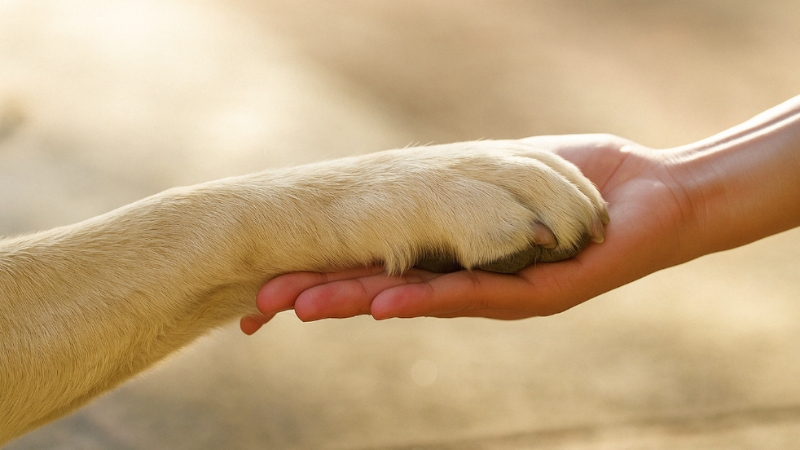Emotional support dogs (ESDs) offer more than just companionship; they provide a calming presence, unconditional love, and a sense of responsibility that can help bring routine and purpose to your day.
Research supports the healing power of animal companionship.
Studies have shown that spending time with dogs can reduce levels of cortisol (the stress hormone), lower blood pressure, and increase serotonin and dopamine — the chemicals that help regulate mood and promote feelings of well-being.
Whether looking for a cuddle buddy during hard times or a companion to keep you motivated, the right dog can make a big difference.
1. Labrador Retriever – The Loyal Stabilizer
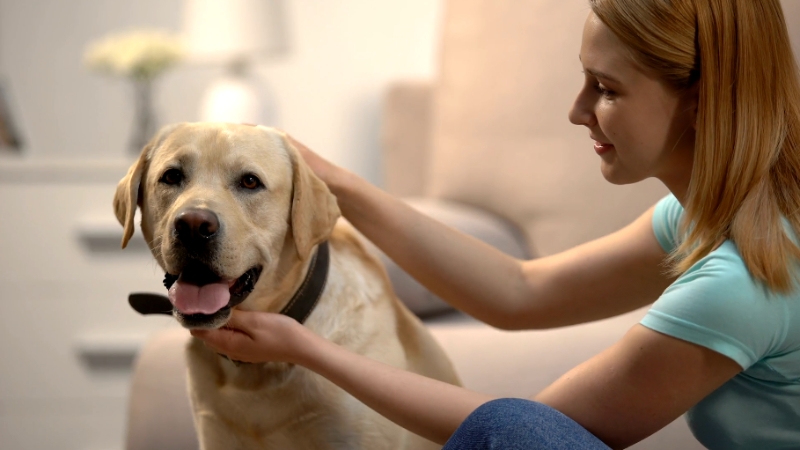
Labrador Retrievers are widely beloved for their joyful energy and steadfast loyalty.
These dogs are incredibly emotionally intelligent and form strong bonds with their people, making them highly responsive to their owners’ mental and emotional states.
When you’re down, stressed, or anxious, Labs seem to just “know” — often responding with a gentle nuzzle, lying by your side, or encouraging you to play.
Their need for daily walks and playtime can serve as a natural motivator for people experiencing depression, helping them stay active and maintain a routine, both critical components in managing mental health.
Labradors are also great for families, making them a versatile option for those who want a dog that brings comfort to everyone at home.
Characteristic
Description
Size
Medium to large (55–80 lbs)
Temperament
Friendly, gentle, affectionate
Energy Level
High needs daily exercise
Trainability
Very easy to train
Emotional Traits
Loyal, attentive, emotionally tuned-in
Ideal For
Active individuals, families, and those needing emotional grounding
2. Golden Retriever – The Gentle Empath
View this post on Instagram
Golden Retrievers are known for their calm and loving nature.
They’re often seen working as therapy and service dogs, and it’s no coincidence — their ability to sense human emotions and respond with gentleness is unmatched.
Whether you’re feeling overwhelmed, anxious, or just need a friend to sit quietly by your side, Goldens offer unwavering support.
These dogs are incredibly affectionate and thrive on close human interaction.
They are especially good for people experiencing loneliness or those who need physical touch for emotional reassurance.
With their soft expressions, soulful eyes, and warm demeanor, Golden Retrievers are emotional sponges who will be right there with you, through every high and low.
Characteristic
Description
Size
Medium to large (55–75 lbs)
Temperament
Calm, affectionate, eager to please
Energy Level
Moderate – needs regular outdoor activity
Trainability
Excellent – responsive and eager
Emotional Traits
Patient, nurturing, gentle
Ideal For
Anyone seeking warmth, affection, and emotional stability
3. Cavalier King Charles Spaniel – The Lap-Loving Comforter
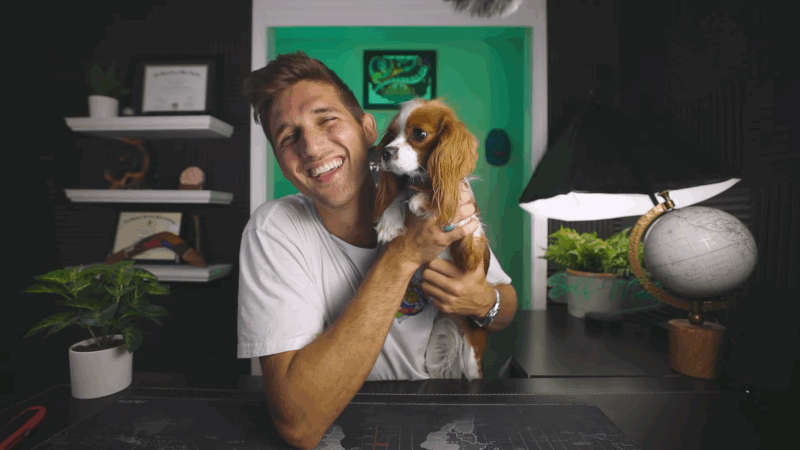
The Cavalier King Charles Spaniel is a small dog with a huge heart. These pups are affectionate to the core and seem to live for cuddles and closeness.
They naturally gravitate toward their owners, often following them from room to room and curling up beside them at every opportunity.
For people struggling with depression or emotional isolation, this closeness can be incredibly healing.
What makes Cavaliers so special is their sensitivity. They’re not high-maintenance dogs — they don’t require long runs or complex training.
Instead, they thrive on being there, right next to you. If you’re someone who values quiet, emotional bonding over high-energy activities, this breed offers a calm, soothing presence that can make tough days feel more manageable.
Characteristic
Description
Size
Small (13–18 lbs)
Temperament
Gentle, sweet, people-focused
Energy Level
Low to moderate
Trainability
Good – enjoys learning simple commands
Emotional Traits
Affectionate, calming, emotionally responsive
Ideal For
Apartment dwellers, quiet homes, people who want emotional closeness
4. Poodle (Toy, Miniature, Standard) – The Brainy Bond-Builder
Poodles are incredibly smart, sensitive, and loving companions. They come in various sizes, so whether you need a small companion for apartment living or a larger dog to accompany you on long walks, there’s a Poodle for you.
But regardless of size, their intelligence and emotional insight remain the same.
These dogs are very trainable, which means they can be taught tasks that may help during episodes of anxiety or emotional distress, such as fetching a comfort item, providing pressure therapy, or nudging you during moments of dissociation.
They’re also hypoallergenic, which makes them a great option for people with allergies or sensitivities. Poodles tend to form very strong emotional connections, making them deeply devoted companions.
Characteristic
Description
Size
Toy (6–9 lbs), Miniature (12–20 lbs), Standard (40–70 lbs)
Temperament
Alert, affectionate, intuitive
Energy Level
Moderate to high
Trainability
Exceptional – among the smartest breeds
Emotional Traits
Observant, responsive, deeply bonded
Ideal For
People with allergies, those who enjoy mental stimulation a,nd training
5. Yorkshire Terrier – The Tiny Guardian
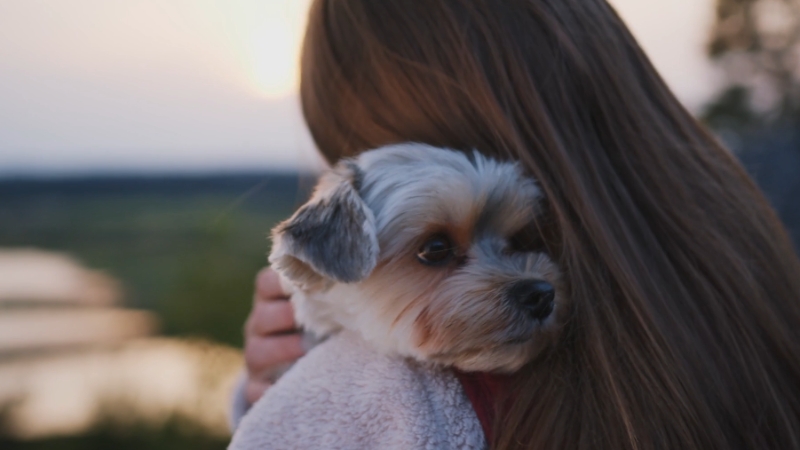
These dogs are extremely loyal and often bond closely with one person, making them an ideal emotional support pet for someone living alone.
Their alert nature and spunky attitude can also provide a sense of purpose and protection, even in the smallest of packages.
For individuals with anxiety, Yorkies can serve as little anchors — always close, always watching.
Their small size makes them perfect for travel or small apartments, and they’re known for being affectionate lap dogs.
They do require a bit of grooming and socialization, but in return, they’ll give you love, loyalty, and a constant furry presence that feels like emotional armor.
Characteristic
Description
Size
Small (4–7 lbs)
Temperament
Loyal, bold, loving
Energy Level
Moderate
Trainability
Good – can be a little independent
Emotional Traits
Deeply attached, comforting, watchful
Ideal For
Individuals in small spaces need deep connection and presence
6. Corgi – The Cheerful Motivator
@littlecooperbear Whether you get a pembroke corgi or a cardigan corgi, they are a herding breed and needs mental and physical stimulation. Stop making them fat. #corgisoftiktok ♬ The Sweet Escape – Gwen Stefani ft. Akon
Corgis — whether Pembroke or Cardigan — are famously cheerful, intelligent, and full of personality.
With their adorable stubby legs and oversized ears, Corgis bring joy just by being in the room. But beyond their cute appearance, these dogs are emotionally intuitive and devoted to their owners, making them wonderful emotional support companions.
One of the most appealing aspects of Corgis is their lively spirit. For someone battling depression or anxiety, their playful energy can serve as a powerful mood booster.
They love engaging in games, going on walks, and being involved in whatever you’re doing, which encourages physical activity and keeps you socially and emotionally engaged.
At the same time, Corgis form very strong bonds with their people and are highly in tune with their moods, offering cuddles, attention, or just their presence when needed most.
Corgis are also known to be a bit comical and dramatic — their expressive faces and quirky behaviors can bring unexpected moments of laughter and joy, which are incredibly therapeutic on difficult days.
Characteristic
Description
Size
Medium (25–30 lbs)
Temperament
Playful, intelligent, devoted
Energy Level
High benefits from structured play and walks
Trainability
Very good – quick learners
Emotional Traits
Cheerful, affectionate, mood-lifting
Ideal For
People need joy, motivation, and a daily routine
7. Havanese – The Velcro Companion
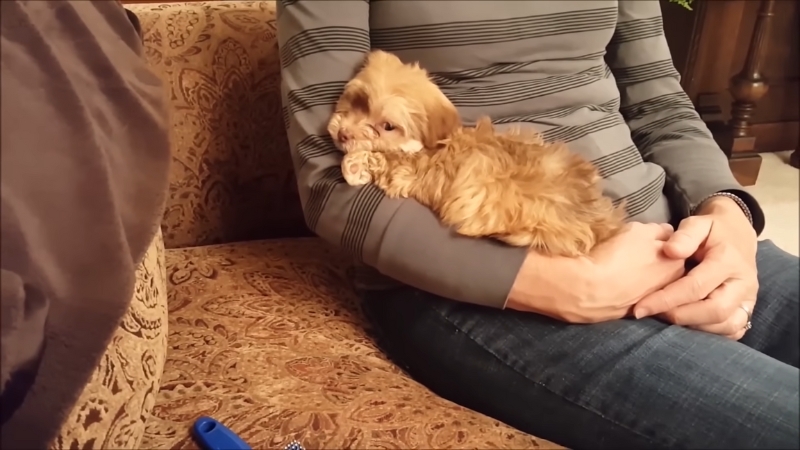
They were bred specifically to be by their owners’ side, and it shows — these dogs form incredibly strong attachments to their humans and don’t like being left alone.
Their affectionate and friendly nature makes them excellent emotional support animals, especially for people who spend a lot of time at home or struggle with emotional isolation.
Havanese are affectionate, loving, and soft in both temperament and physical presence.
They rarely show aggression and are very adaptable, fitting into various lifestyles — whether you’re living in an apartment, a house, or with other pets.
Their constant desire to be near you creates a steady emotional anchor that many people with anxiety and depression find comforting.
They’re also very intuitive and quick to respond to changes in mood, often cuddling close or sitting quietly when they sense their human needs comfort.
They don’t require a lot of exercise but do love playtime and walks, helping establish a light structure in your day.
Characteristic
Description
Size
Small (7–13 lbs)
Temperament
Gentle, affectionate, loyal
Energy Level
Moderate – enjoys short walks and play
Trainability
Highly eager to please
Emotional Traits
Clingy, calming, responsive
Ideal For
People at home often need near-constant companionship
8. Border Collie – The Intelligent Helper
Border Collies, often cited as the most intelligent of all domestic dogs. pic.twitter.com/kJWaKm32fy
— Wow Animals (@WOW_ANIMALS1) November 27, 2023
Border Collies are considered the most intelligent of all dog breeds. They are extremely trainable and deeply loyal, forming strong attachments to their people.
While they may not be the first breed that comes to mind for emotional support, they’re an excellent match for individuals who benefit from structure, stimulation, and interactive companionship.
For those with depression, engaging in training, routines, or even agility activities with a Border Collie can serve as a meaningful form of therapy.
Their focus and attention to detail make them responsive to emotional shifts — they’ll often come to your side, nudge your hand, or try to engage you when they sense something’s off.
That said, Border Collies do best with active or semi-active owners who can meet their need for exercise and mental engagement. If you’re up for the task, they’ll reward you with intense loyalty, sharp intelligence, and an emotional bond that runs incredibly deep.
Characteristic
Description
Size
Medium (30–45 lbs)
Temperament
Focused, attentive, loyal
Energy Level
High – thrives on daily activity and mental games
Trainability
Excellent – one of the most trainable breeds
Emotional Traits
Sharp, deeply bonded, responsive to mood
Ideal For
People need structured routines, motivation, and cognitive engagement
9. Bichon Frise – The Joy Bringer

These cheerful little fluffballs have a bright, bubbly personality and a loving heart. They seem to have an innate ability to lift the spirits of those around them just by being themselves.
Bichons love attention and cuddling, and they’re often happiest when snuggled up with their humans.
They’re also hypoallergenic, which makes them a solid choice for those with allergies who still want a close emotional bond with a pet.
Their need for regular grooming and care can be therapeutic in itself — a gentle reminder to stay on top of daily tasks and take care of something that loves you unconditionally.
Their playful demeanor, curious nature, and friendly outlook on life can serve as a bright spot for individuals experiencing depressive episodes, making every day a little lighter and more joyful.
Characteristic
Description
Size
Small (10–20 lbs)
Temperament
Cheerful, loving, upbeat
Energy Level
Moderate – enjoys playtime and short walks
Trainability
Very good – eager to engage
Emotional Traits
Playful, affectionate, uplifting
Ideal For
Those needing a mood booster and emotional companionship in a small package
10. French Bulldog – The Quiet Companion
View this post on Instagram
French Bulldogs are perfect for individuals seeking a mellow, low-energy emotional support dog. These dogs are loving, low-maintenance, and have a calm presence that brings comfort to people experiencing emotional exhaustion, anxiety, or depression.
With their snuggly, “couch potato” nature, Frenchies don’t ask for much other than your love, and they’ll return it unconditionally.
Frenchies are especially valuable companions for people who have limited energy or mobility, as they don’t require extensive exercise or stimulation.
A few short walks and some play indoors are usually enough to keep them happy.
They’re also great for apartment living and tend to be fairly quiet and relaxed, reducing potential stressors like excessive barking or destructive behavior.
Most importantly, they love to be near their people.
Their loyalty and calm energy create a reassuring emotional presence that makes them a favorite for those who just need someone close to ride out the storm with.
Characteristic
Description
Size
Small to medium (16–28 lbs)
Temperament
Calm, affectionate, loving
Energy Level
Low – short walks and indoor play are enough
Trainability
Good – consistent and patient training works well
Emotional Traits
Quiet, steady, comforting
Ideal For
People with lower energy levels, quiet homes, and apartment dwellers
Conclusion
Living with anxiety or depression can feel like carrying the weight of the world on your shoulders. But having a loyal, loving companion by your side can make the journey lighter, the days brighter, and the tough moments a little more bearable. Emotional support dogs don’t just offer comfort — they bring routine, connection, laughter, and unconditional love when it’s needed most.
Whether you’re drawn to the boundless joy of a Labrador, the calming presence of a Cavalier, or the steady companionship of a French Bulldog, the right dog can become more than a pet — they can become a lifeline, a friend, and a source of peace when words aren’t enough.
In the same way, recognizing the difference between violence and abuse can empower you to seek help and make healthier choices for your well-being.
Remember, the best emotional support dog is one that connects with you. It’s about the bond, not the breed. Take your time, trust your instincts, and when you’re ready, open your heart. The love of a dog won’t cure everything, but it can remind you, day after day, that you are never alone.
Because sometimes, the best kind of therapy has four legs and a wagging tail.

